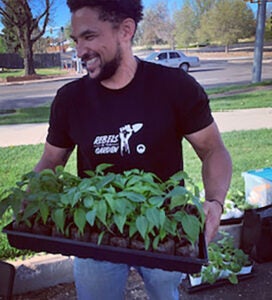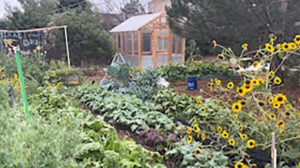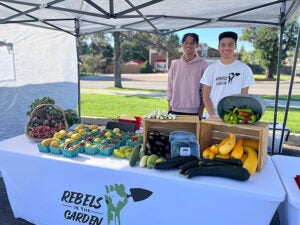Urban agriculture — the practice of cultivating crops or livestock within city limits — is a growing movement across the United States, emerging from reasons as varied as the demand for fresh food in metro areas, goals to combat climate change, and even beautifying neighborhoods. Urban ag is oftentimes a valuable means of boosting food security and income for urban residents.
For James Grevious, an urban farmer based in Aurora, Colorado, his motivations stem from the desire to foster community and bridge the gap of food access between urban and rural communities.
Grevious, an African-American military veteran, first became interested in agriculture in 2015, when he founded a garden with his children. He was searching for a project to work on with his kids that could teach them lessons and principles, and he was inspired by Ron Finley’s TED Talk, where Finley advocated for urban agriculture in Los Angeles.
After founding Rebels in the Garden with his children, Grevious cultivated a passion for urban agriculture that grew into a commercial operation, which he named Rebel Market Place. He later launched a nonprofit to better serve other Black and minority growers called Urban Symbiosis. Today, Grevious manages an acre lot growing lettuce, radishes, beets, and other vegetables.

Knowing how labor intensive farming is, Grevious says that managing a lot the size of one acre is ideal for him. The appeal of urban agriculture to him is the opportunity to fill the gap between rural and urban access to food, and Grevious believes in localizing your food source as a means to improve access and ensure sustainability.
Today, Grevious partners with multiple community members to host Rebel Market Place, which supports businesses within a six-mile radius to create a neighborhood market. By limiting his efforts to a smaller area, Grievous hopes to lower the barrier to entry for aspiring gardeners to convert to producers, while uniting the neighborhood community via commerce and involvement. Grievous promotes becoming a vendor at Rebel Market Place, and hosts his market every other Saturday from May to October.
While Grevious has made the jump from being a home gardener to a production grower, he says many people are discouraged from taking the same leap. Learning how to turn his operation into a profitable business was a big challenge, and Grevious hopes he can promote and encourage others through his nonprofit work at Urban Symbiosis.
“The purest, selfless, most intimate thing you can do is to produce something that will feed somebody else,” he said.
Grevious has seen firsthand the impact his practice has had on his community. The food he grows helps foster connections within his community, and is a great way to heal from generational trauma that many Black people suffer from.
“When I bit into the first tomato I had grown, there was a ‘woah’ moment for me, tasting that flavor,” said Grevious. Having grown up on welfare and food stamps, he said he never enjoyed eating fruits and vegetables until he started growing his own.

Of course, urban growers are not immune to problems and issues facing farmers everywhere. Even so, Grevious is optimistic about the role that urban agricultural producers can play in the sector.
“Urban farmers are in a [great] position as stewards for water rights, and [we] can focus on improving soil health because [we grow in] a smaller area,” Grevious said. He said these factors are essential in shifting agriculture toward a more sustainable practice.
In his own operations, he uses ollas, a centuries-old irrigation method that can conserve and save precious water for his crops. Ollas are traditionally clay pots that are buried in the soil, with the top above the soil. The pots are filled with water, and as the surrounding plants uptake water from the ground, the dry soil draws water from the pots. If it rains and the soil is wet, the water will remain in the pot, thereby conserving water usage and protecting crops from undergoing stress conditions of drought and overwatering.
For many urban growers, using ollas is a practical and sustainable way to manage irrigating their crops.

Urban farmers sometimes even have to contend with unconventional issues, such as pets or even racoons ravaging their gardens. Since most urban growers grow in a smaller area, every single plant really matters.
“In the end, everything goes back to water rights,” Grevious said. It’s a challenge that urban growers must contend with as they draw water usage from their rural counterparts to produce their crops.
Understanding that there needs to be policy changes that could improve irrigation and soil health is something that Grevious says is essential to guarantee the survival of farming in the Southwest — and the nation in general.
Ultimately, Grevious believes that urban agriculture is not meant to replace traditional farming, but can be a sustainable practice that would help alleviate food supply chain issues while fostering a close-knit community that cares.
“Agriculture is the glue that holds everybody together,” he said.
Liza Thuy Nguyen serves as the 2023 American Farmland Trust Agriculture Communications Intern at AGDAILY, with a focus on helping to amplify diversity and minority voices in agriculture. Liza is originally from Anaheim, California, and attended the University of California, Davis, as a first-generation college student. She received a bachelor’s degree in genetics and genomics and went on to earn a master’s in horticulture from Penn State.




